Welcome to DU!
The truly grassroots left-of-center political community where regular people, not algorithms, drive the discussions and set the standards.
Join the community:
Create a free account
Support DU (and get rid of ads!):
Become a Star Member
Latest Breaking News
General Discussion
The DU Lounge
All Forums
Issue Forums
Culture Forums
Alliance Forums
Region Forums
Support Forums
Help & Search
Celerity
Celerity's Journal
Celerity's Journal
April 19, 2024

What are the big takeaways from Swift’s new album? She’s refining her sound, confronting elements of her fanbase and done with romantic idealisation
https://www.theguardian.com/music/2024/apr/19/taylor-swift-album-the-tortured-poets-department-lyrics

She’s rebuking the public for the first time
Swift named an entire album after the concept of her reputation and has been engaging with public perceptions of her as far back as 2010’s Speak Now; songs such as Mean, Blank Space and the gothic half of Reputation lash out directly at critics. But she’s never openly condemned her listeners before her new album The Tortured Poets Department, in songs that constitute some of its most daring moments. Who’s Afraid of Little Old Me? feels like a deservedly bitter, barbed update of the cutesier and more cloying Anti-Hero that suggests Swift is the way she is because of the twisted culture she grew up in and had to contort herself to fit into: “You taught me, you caged me, and then you called me crazy,” she seethes, sounding quite high on the fearsome power commentators have ascribed to her.
Most thrilling is But Daddy I Love Him, named after a line that astute listeners will recognise from The Little Mermaid as Ariel protests to King Triton that she’s in love with landlubbing human Eric. It’s very clearly about the pearl-clutching that transpired when Swift started dating Matty Healy of the 1975 last spring. She was fresh out of a six-year relationship with actor Joe Alwyn; Healy was in trouble for laughing at racist jokes on a podcast, an incident that led concerned Swift fans to dig up his previous controversies and pen (pathetic) open letters petitioning her to break up with him. The song hints that even her management and family tried to get her to end it (“soon enough the elders had convened down at the city hall”). But Healy’s notoriety, the song makes clear, was partially the point: “He was chaos / he was revelry,” she sings ecstatically, then directs her ire to the “Sarahs and Hannahs in their Sunday best” and the “wine moms” castigating her choices:

There’s something quite seditious about the stadium-sized euphoria of the song – that she can criticise elements of her audience and make them sing along with those criticisms – as well as the subtle country musicianship that blossoms towards the end, gesturing at the precocious and scrupulously behaved country star that Swift once was and that many expect her to still be. The punchline is great – “I’m having his baby / No I’m not but you should see your faces” – but the sentiment about who gets to decide what’s right for her, as a 34-year-old woman who’s been working for 20 years, is even better. Later, on Guilty as Sin?, she details the boredom she seemed to feel in her previous relationship and questions “if long-suffering propriety is what they want from me”. Swift has questioned the contract of likability that female pop stars are expected to uphold with the public before, and has been untangling the concept of the “good girl” she was raised to be for several years, but has never made quite so plain that she has no intention of living up to it any more.
She’s rejecting idealisation

As well as trouncing expectations that she should uphold some level of respectability, Swift also reckons with the limits of romantic idealisation, as seen from both sides. She makes very clear that the thought of Healy captivated her while her relationship with Alwyn was foundering – to the degree that Guilty as Sin? documents her fantasies about Healy, prompting categorically the first allusion to masturbation in her catalogue: “These fatal fantasies / Giving way to laboured breath / Taking all of me / We’ve already done it in my head.” Once they got together, she sings, they both told friends that they’d die without one another; she swears she can reform his bad habits. But the fantasies turn out to be just that: The Smallest Man Who Ever Lived is a Dear John/All Too Well-level evisceration of how he “hung me on your wall / Stabbed me with your push pins / In public showed me off / Then sank in stoned oblivion”, and ultimately ghosted her. The sheen dulls to black: “I’ll say good riddance,” she sings, “cos it wasn’t sexy once it wasn’t forbidden.”
It’s her funniest album …
snip
Breakups, fantasies and her most cutting lyrics: inside Taylor's Swift's The Tortured Poets Department

What are the big takeaways from Swift’s new album? She’s refining her sound, confronting elements of her fanbase and done with romantic idealisation
https://www.theguardian.com/music/2024/apr/19/taylor-swift-album-the-tortured-poets-department-lyrics

She’s rebuking the public for the first time
Swift named an entire album after the concept of her reputation and has been engaging with public perceptions of her as far back as 2010’s Speak Now; songs such as Mean, Blank Space and the gothic half of Reputation lash out directly at critics. But she’s never openly condemned her listeners before her new album The Tortured Poets Department, in songs that constitute some of its most daring moments. Who’s Afraid of Little Old Me? feels like a deservedly bitter, barbed update of the cutesier and more cloying Anti-Hero that suggests Swift is the way she is because of the twisted culture she grew up in and had to contort herself to fit into: “You taught me, you caged me, and then you called me crazy,” she seethes, sounding quite high on the fearsome power commentators have ascribed to her.
Most thrilling is But Daddy I Love Him, named after a line that astute listeners will recognise from The Little Mermaid as Ariel protests to King Triton that she’s in love with landlubbing human Eric. It’s very clearly about the pearl-clutching that transpired when Swift started dating Matty Healy of the 1975 last spring. She was fresh out of a six-year relationship with actor Joe Alwyn; Healy was in trouble for laughing at racist jokes on a podcast, an incident that led concerned Swift fans to dig up his previous controversies and pen (pathetic) open letters petitioning her to break up with him. The song hints that even her management and family tried to get her to end it (“soon enough the elders had convened down at the city hall”). But Healy’s notoriety, the song makes clear, was partially the point: “He was chaos / he was revelry,” she sings ecstatically, then directs her ire to the “Sarahs and Hannahs in their Sunday best” and the “wine moms” castigating her choices:

There’s something quite seditious about the stadium-sized euphoria of the song – that she can criticise elements of her audience and make them sing along with those criticisms – as well as the subtle country musicianship that blossoms towards the end, gesturing at the precocious and scrupulously behaved country star that Swift once was and that many expect her to still be. The punchline is great – “I’m having his baby / No I’m not but you should see your faces” – but the sentiment about who gets to decide what’s right for her, as a 34-year-old woman who’s been working for 20 years, is even better. Later, on Guilty as Sin?, she details the boredom she seemed to feel in her previous relationship and questions “if long-suffering propriety is what they want from me”. Swift has questioned the contract of likability that female pop stars are expected to uphold with the public before, and has been untangling the concept of the “good girl” she was raised to be for several years, but has never made quite so plain that she has no intention of living up to it any more.
She’s rejecting idealisation

As well as trouncing expectations that she should uphold some level of respectability, Swift also reckons with the limits of romantic idealisation, as seen from both sides. She makes very clear that the thought of Healy captivated her while her relationship with Alwyn was foundering – to the degree that Guilty as Sin? documents her fantasies about Healy, prompting categorically the first allusion to masturbation in her catalogue: “These fatal fantasies / Giving way to laboured breath / Taking all of me / We’ve already done it in my head.” Once they got together, she sings, they both told friends that they’d die without one another; she swears she can reform his bad habits. But the fantasies turn out to be just that: The Smallest Man Who Ever Lived is a Dear John/All Too Well-level evisceration of how he “hung me on your wall / Stabbed me with your push pins / In public showed me off / Then sank in stoned oblivion”, and ultimately ghosted her. The sheen dulls to black: “I’ll say good riddance,” she sings, “cos it wasn’t sexy once it wasn’t forbidden.”
It’s her funniest album …
snip
April 19, 2024

https://aeon.co/videos/tiny-entangled-universes-that-form-or-fizzle-out-a-theory-of-the-quantum-multiverse
In recent decades, cosmic inflation theory has largely settled the once-daunting existential question of ‘How did the Universe begin?’ for most physicists. That is to say that, from a singular hot, dense and small starting point, the just-right conditions for the emergence of the Universe were met. This set the stage for the unfathomably rapid expansion of the Big Bang and the emergent laws of physics that we observe today.
However, as the Albanian American cosmologist Laura Mersini-Houghton explains to the American host Robert Lawrence Kuhn in this instalment of his series Closer to Truth, the first fraction of a second of the Universe, just before the Big Bang, is still a wide-open scientific frontier. Exploring the fertile ground where observation meets theory, Mersini-Houghton explains why she believes the improbable existence of our Universe suggests a quantum multiverse in which some potential universes fizzle into oblivion, and others form classical universes like our own.
Video by Closer to Truth
It’s among the oldest questions because we humans are rightly obsessed by ultimate origins. Cosmologists can now explain back to the first 10-36 second of our universe - with the theory of “cosmic inflation”, which is what put the “bang” into the Big Bang. What is recent thinking on the beginning of the universe?


Tiny, entangled universes that form or fizzle out - a theory of the quantum multiverse

https://aeon.co/videos/tiny-entangled-universes-that-form-or-fizzle-out-a-theory-of-the-quantum-multiverse
In recent decades, cosmic inflation theory has largely settled the once-daunting existential question of ‘How did the Universe begin?’ for most physicists. That is to say that, from a singular hot, dense and small starting point, the just-right conditions for the emergence of the Universe were met. This set the stage for the unfathomably rapid expansion of the Big Bang and the emergent laws of physics that we observe today.
However, as the Albanian American cosmologist Laura Mersini-Houghton explains to the American host Robert Lawrence Kuhn in this instalment of his series Closer to Truth, the first fraction of a second of the Universe, just before the Big Bang, is still a wide-open scientific frontier. Exploring the fertile ground where observation meets theory, Mersini-Houghton explains why she believes the improbable existence of our Universe suggests a quantum multiverse in which some potential universes fizzle into oblivion, and others form classical universes like our own.
Video by Closer to Truth
It’s among the oldest questions because we humans are rightly obsessed by ultimate origins. Cosmologists can now explain back to the first 10-36 second of our universe - with the theory of “cosmic inflation”, which is what put the “bang” into the Big Bang. What is recent thinking on the beginning of the universe?


April 19, 2024

The café chain Knoops — speciality: sweet milky cocoa drinks — is about to expand across Britain. Surely real men drink coffee? No, says Simon Mills. Plus: Tony Turnbull and Hilary Rose have their say
https://www.thetimes.co.uk/article/is-posh-hot-chocolate-the-new-flat-white-3bml8x9q5
https://archive.ph/adiPZ

Adults drink coffee. Real coffee from a cafetière or a stove-top Bialetti. Or order it to their bespoke liking from a chain café or a hipster place where a man with a beard and sailor tattoos will take ages to make it and charge you almost five quid for the pleasure. This is now a globally accepted, sociopolitical beverage culture. Caffeine is the only hot drink choice of the busy and stressed-out, careerist metropolitan and impatient sophisticate. It is tetchy and self-centred and I-can’t-do-anything-till-I’ve-had-my-cortado. Don’t-even-talk-to-me-before-my-first-pea-milk-latte. In fact I’m so busy, I have to drink it while I’m walking, driving, dashing for the train — from a plastic, infantilising sippy cup arrangement that makes me look like a big baby. Always “to go”, coffee lasts for just one or two hot minutes, costs more per mouthful than a half-decent off-licence wine and makes you jittery and nervy.
Hot chocolate is a more indulgent beverage. You sit with it. Cup your hands around it. Wallow in its heat and sweetness. Hot chocolate’s cocoa content has benefits too — it contains theobromine, a mild stimulant that releases serotonin and endorphins, encouraging happiness and pleasure, instantly lifting mood and spirit. It won’t have you jonesing like coffee does. Its colour and texture make a nice Instagram picture, its soporific milkiness will tempt you with an afternoon nap. It is the choice of the decadent unemployable and the free-posting influencer. And now, just like coffee before it, hot chocolate is about to get commercially caffeinated too.
With its eye on becoming hot chocolate’s equivalent of Starbucks, the British brand Knoops, currently with 17 shops in the UK, has plans for 40 … and then 300. Having secured partners in the Middle East and pending discussions in America and China, the chain aims to hit its target of 3,000 shops globally by 2030. “We’re a category killer,” says William Gordon-Harris, the Knoops chief executive, who discovered the brand in Rye, East Sussex, four years ago when it was run by its German founder, Jens Knoop. “We have no competitors in the world that do what we do and I think that with the right ambition, combined with the right systems and people, I don’t believe there’s any way we can’t build a billion-dollar brand here.” (Knoop, by the way, is the German for “Button” — chocolate button!)

Go to Knoops on Kensington High Street or Chelsea and you’ll find a carefully curated menu of hot and cold chocolate drinks with more than 20 strengths and styles of cacao. Choices range from 70 per cent single-origin Congo variety with notes of cherries and black tea and a subtle earthiness to 49 per cent single-origin Venezuelan with notes of molasses, pecan and coffee. Expect fruit and nuts prices too — £6.95 for a regular cup — and big queues. This overgrown Milky Bar kid is already a Knoops convert, having made regular lockdown trips to my local branch with my two daughters in 2021. During those cold evenings, quiet lines formed to get a hot hit of dark pleasure during an even darker time. On pretty much every visit I was the only man in the (socially distanced) shop. I was easily the oldest person too.
snip









Is posh hot chocolate the new flat white?

The café chain Knoops — speciality: sweet milky cocoa drinks — is about to expand across Britain. Surely real men drink coffee? No, says Simon Mills. Plus: Tony Turnbull and Hilary Rose have their say
https://www.thetimes.co.uk/article/is-posh-hot-chocolate-the-new-flat-white-3bml8x9q5
https://archive.ph/adiPZ

Adults drink coffee. Real coffee from a cafetière or a stove-top Bialetti. Or order it to their bespoke liking from a chain café or a hipster place where a man with a beard and sailor tattoos will take ages to make it and charge you almost five quid for the pleasure. This is now a globally accepted, sociopolitical beverage culture. Caffeine is the only hot drink choice of the busy and stressed-out, careerist metropolitan and impatient sophisticate. It is tetchy and self-centred and I-can’t-do-anything-till-I’ve-had-my-cortado. Don’t-even-talk-to-me-before-my-first-pea-milk-latte. In fact I’m so busy, I have to drink it while I’m walking, driving, dashing for the train — from a plastic, infantilising sippy cup arrangement that makes me look like a big baby. Always “to go”, coffee lasts for just one or two hot minutes, costs more per mouthful than a half-decent off-licence wine and makes you jittery and nervy.
Hot chocolate is a more indulgent beverage. You sit with it. Cup your hands around it. Wallow in its heat and sweetness. Hot chocolate’s cocoa content has benefits too — it contains theobromine, a mild stimulant that releases serotonin and endorphins, encouraging happiness and pleasure, instantly lifting mood and spirit. It won’t have you jonesing like coffee does. Its colour and texture make a nice Instagram picture, its soporific milkiness will tempt you with an afternoon nap. It is the choice of the decadent unemployable and the free-posting influencer. And now, just like coffee before it, hot chocolate is about to get commercially caffeinated too.
With its eye on becoming hot chocolate’s equivalent of Starbucks, the British brand Knoops, currently with 17 shops in the UK, has plans for 40 … and then 300. Having secured partners in the Middle East and pending discussions in America and China, the chain aims to hit its target of 3,000 shops globally by 2030. “We’re a category killer,” says William Gordon-Harris, the Knoops chief executive, who discovered the brand in Rye, East Sussex, four years ago when it was run by its German founder, Jens Knoop. “We have no competitors in the world that do what we do and I think that with the right ambition, combined with the right systems and people, I don’t believe there’s any way we can’t build a billion-dollar brand here.” (Knoop, by the way, is the German for “Button” — chocolate button!)

Go to Knoops on Kensington High Street or Chelsea and you’ll find a carefully curated menu of hot and cold chocolate drinks with more than 20 strengths and styles of cacao. Choices range from 70 per cent single-origin Congo variety with notes of cherries and black tea and a subtle earthiness to 49 per cent single-origin Venezuelan with notes of molasses, pecan and coffee. Expect fruit and nuts prices too — £6.95 for a regular cup — and big queues. This overgrown Milky Bar kid is already a Knoops convert, having made regular lockdown trips to my local branch with my two daughters in 2021. During those cold evenings, quiet lines formed to get a hot hit of dark pleasure during an even darker time. On pretty much every visit I was the only man in the (socially distanced) shop. I was easily the oldest person too.
snip









April 19, 2024

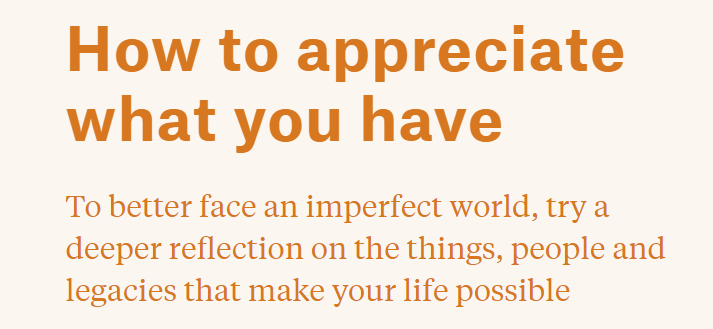
https://psyche.co/guides/how-to-appreciate-what-you-have-even-when-it-is-not-perfect

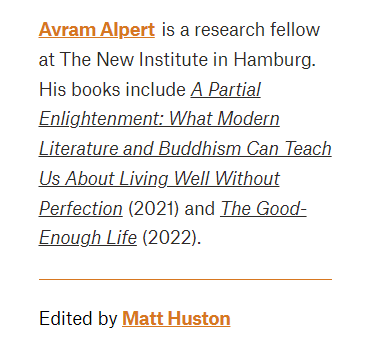

To appreciate what you have is to recognise the value of the people, things and world around you, as well as your own attributes – and to treat all of these with the care and consideration they deserve. In this sense, appreciation means not just being grateful for what you have or what you’ve been given, because gratitude does not necessarily imply an attitude of care and consideration. Appreciation, as I use it here, may begin with thankfulness for what you have, but it goes beyond that to a broader understanding of how the world works and what is valuable in that. Appreciation can also lead us to a critical attitude in a way that gratitude does not, because we may recognise that the world and its inhabitants are not cared for as they should be. It is not easy to engage in this kind of appreciation, and not only because it asks us to think in these multiple registers. Even when things are going well, you might not feel that you appreciate it all as much as you could or should. Alternatively, maybe you’re not sure that you have anything genuinely worth appreciating. There are many general reasons why appreciation can be challenging, and they stretch across psychology, culture, economics and politics.
Humans are incredibly complex creatures with competing instincts. We have neurons telling us to get what’s ours and to achieve social status, while simultaneously leading us to underestimate our gains. One explanation for this is that we evolved to go through a boom-and-bust pleasure loop. Humans don’t just have to eat or procreate once, in order to pass on their genes; we have to do it continually. So we are led to desire something, get it, and then not be satisfied by it. The famous image for this in modern psychology is the hedonic treadmill: we’re always running toward what we think will make us happier, and always ending up back where we started. Contemporary culture often adds pressure to this dynamic. Reports suggest that many of us, and especially young people – from the United States to China, and everywhere in between – are feeling burnt out and overwhelmed by never-have-enough cultural messaging. People are told to work hard to get ahead, but many are finding themselves stifled by limited opportunity, and even those who do get ahead don’t necessarily feel any happier or more fulfilled. There are also the very real economic pressures created by winner-take-all economies and cost-of-living crises.
Even people who may have once felt that they had enough have been squeezed by inflation and variable interest rates. On top of all of that is the looming danger of climate change and the creeping sense that you might not be able to survive without having power over vast resources. If you’re like me, you might also have some political resistance to the idea of appreciation. The idea that we should ‘appreciate what we have’ can strike one as a ruling-class ideology: ‘You peasants should be grateful we feed you slop at all.’ We shouldn’t appreciate – we should have a revolution! I understand this resistance. But over time, I have come to believe that not appreciating what I have is an even crueller way of looking at the world. It’s like a little voice in your head saying: ‘Not only do you not have enough, but you should also be miserable about it.’ I remain a diehard egalitarian who is horrified by the levels of inequality in this world. But I no longer think that refusing to appreciate what I have is going to make the world a better place, or make us as individuals any more likely to change things.
In fact, once I opened up to the idea, I realised that, for myself at least, the more appreciative I am, the more I care about the world and institutions around me, and the more I want to help them improve. And for many people, because appreciation may improve your wellbeing and increase your concern for the world around you, it could even make you more likely to engage in political activity. I write could rather than will because of the fact of our different psychological make-ups. Many people want to change things precisely because of unhappiness with the current situation, after all. So not everyone will benefit from increasing their appreciation, but everyone might as well try it out before deciding that. This Guide is an invitation to take up that attempt. It is written from my perspective as someone who has studied various philosophical, religious and literary traditions that have something to say about appreciation. In many times and places, you can find a focus on heroism, greatness and the elite, with the accompanying belief that we should appreciate what the best among us have to offer. In other settings, there is more of a focus on the value of all of our lives, and a sense that what makes this world work is the mutual appreciation of equals. When I write about appreciating what you have, I mean it in this latter, universal sense.

To better appreciate what you have, a key task is.................................
snip
How to appreciate what you have


https://psyche.co/guides/how-to-appreciate-what-you-have-even-when-it-is-not-perfect



To appreciate what you have is to recognise the value of the people, things and world around you, as well as your own attributes – and to treat all of these with the care and consideration they deserve. In this sense, appreciation means not just being grateful for what you have or what you’ve been given, because gratitude does not necessarily imply an attitude of care and consideration. Appreciation, as I use it here, may begin with thankfulness for what you have, but it goes beyond that to a broader understanding of how the world works and what is valuable in that. Appreciation can also lead us to a critical attitude in a way that gratitude does not, because we may recognise that the world and its inhabitants are not cared for as they should be. It is not easy to engage in this kind of appreciation, and not only because it asks us to think in these multiple registers. Even when things are going well, you might not feel that you appreciate it all as much as you could or should. Alternatively, maybe you’re not sure that you have anything genuinely worth appreciating. There are many general reasons why appreciation can be challenging, and they stretch across psychology, culture, economics and politics.
Humans are incredibly complex creatures with competing instincts. We have neurons telling us to get what’s ours and to achieve social status, while simultaneously leading us to underestimate our gains. One explanation for this is that we evolved to go through a boom-and-bust pleasure loop. Humans don’t just have to eat or procreate once, in order to pass on their genes; we have to do it continually. So we are led to desire something, get it, and then not be satisfied by it. The famous image for this in modern psychology is the hedonic treadmill: we’re always running toward what we think will make us happier, and always ending up back where we started. Contemporary culture often adds pressure to this dynamic. Reports suggest that many of us, and especially young people – from the United States to China, and everywhere in between – are feeling burnt out and overwhelmed by never-have-enough cultural messaging. People are told to work hard to get ahead, but many are finding themselves stifled by limited opportunity, and even those who do get ahead don’t necessarily feel any happier or more fulfilled. There are also the very real economic pressures created by winner-take-all economies and cost-of-living crises.
Even people who may have once felt that they had enough have been squeezed by inflation and variable interest rates. On top of all of that is the looming danger of climate change and the creeping sense that you might not be able to survive without having power over vast resources. If you’re like me, you might also have some political resistance to the idea of appreciation. The idea that we should ‘appreciate what we have’ can strike one as a ruling-class ideology: ‘You peasants should be grateful we feed you slop at all.’ We shouldn’t appreciate – we should have a revolution! I understand this resistance. But over time, I have come to believe that not appreciating what I have is an even crueller way of looking at the world. It’s like a little voice in your head saying: ‘Not only do you not have enough, but you should also be miserable about it.’ I remain a diehard egalitarian who is horrified by the levels of inequality in this world. But I no longer think that refusing to appreciate what I have is going to make the world a better place, or make us as individuals any more likely to change things.
In fact, once I opened up to the idea, I realised that, for myself at least, the more appreciative I am, the more I care about the world and institutions around me, and the more I want to help them improve. And for many people, because appreciation may improve your wellbeing and increase your concern for the world around you, it could even make you more likely to engage in political activity. I write could rather than will because of the fact of our different psychological make-ups. Many people want to change things precisely because of unhappiness with the current situation, after all. So not everyone will benefit from increasing their appreciation, but everyone might as well try it out before deciding that. This Guide is an invitation to take up that attempt. It is written from my perspective as someone who has studied various philosophical, religious and literary traditions that have something to say about appreciation. In many times and places, you can find a focus on heroism, greatness and the elite, with the accompanying belief that we should appreciate what the best among us have to offer. In other settings, there is more of a focus on the value of all of our lives, and a sense that what makes this world work is the mutual appreciation of equals. When I write about appreciating what you have, I mean it in this latter, universal sense.

To better appreciate what you have, a key task is.................................
snip
April 19, 2024
https://www.thelocal.se/20240411/new-team-sweden-group-to-boost-swedens-global-image
https://archive.ph/wQgti

Last year, Sweden was named in international media ten times more than the year before, according to the Swedish Institute, a state-run organisation whose job it is to promote the country abroad. And it was not all positive. According to the Swedish Institute, in Turkey and Saudi Arabia around 40 percent of all content related to a series of rallies at which activists burned copies of the Quran, reports the Dagens Nyheter (DN) daily.
Simultaneously, a conspiracy campaign falsely claiming that the Swedish social services regularly kidnap Muslim children gained traction and also contributed to a more negative image of the Nordic country in large parts of the Arab world, despite attempts to counter the disinformation. “We as a government have spent a lot of time on these issues. I myself have made trips to the region to meet political leaders and business people. Last autumn, I probably thought that the consequences for trade would be greater than they were,” Sweden’s Foreign Trade Minister Johan Forssell told DN.
Despite expectations, trade between Sweden and the Middle East increased during this period, but Forsell said action was still needed to strengthen the country’s image. To do this, he has this week told the Swedish Institute to form a new group called “Team Sweden”, which will focus exclusively on boosting Sweden's international reputation. Promoting Sweden as an innovative country, with a particular focus on digitalisation and being an environmentally sustainable economy and society, will be one of the group’s main objectives.
“There’s partly a security component. We know that actors deliberately spread false information that risks having very drastic results,” Forsell told DN. “And partly we see how many businesses are affected by the Sweden image. These statements can sometimes have direct consequences for their profits and losses,” he added. The new group will replace parts of the existing Council for the Promotion of Sweden, which is to be discontinued.
snip
New 'Team Sweden' group to boost Sweden's global image
Sweden is putting together a new group to boost the country’s international reputation, following a series of disinformation campaigns and Quran burnings which stirred outrage in the Arab world.https://www.thelocal.se/20240411/new-team-sweden-group-to-boost-swedens-global-image
https://archive.ph/wQgti

Last year, Sweden was named in international media ten times more than the year before, according to the Swedish Institute, a state-run organisation whose job it is to promote the country abroad. And it was not all positive. According to the Swedish Institute, in Turkey and Saudi Arabia around 40 percent of all content related to a series of rallies at which activists burned copies of the Quran, reports the Dagens Nyheter (DN) daily.
Simultaneously, a conspiracy campaign falsely claiming that the Swedish social services regularly kidnap Muslim children gained traction and also contributed to a more negative image of the Nordic country in large parts of the Arab world, despite attempts to counter the disinformation. “We as a government have spent a lot of time on these issues. I myself have made trips to the region to meet political leaders and business people. Last autumn, I probably thought that the consequences for trade would be greater than they were,” Sweden’s Foreign Trade Minister Johan Forssell told DN.
Despite expectations, trade between Sweden and the Middle East increased during this period, but Forsell said action was still needed to strengthen the country’s image. To do this, he has this week told the Swedish Institute to form a new group called “Team Sweden”, which will focus exclusively on boosting Sweden's international reputation. Promoting Sweden as an innovative country, with a particular focus on digitalisation and being an environmentally sustainable economy and society, will be one of the group’s main objectives.
“There’s partly a security component. We know that actors deliberately spread false information that risks having very drastic results,” Forsell told DN. “And partly we see how many businesses are affected by the Sweden image. These statements can sometimes have direct consequences for their profits and losses,” he added. The new group will replace parts of the existing Council for the Promotion of Sweden, which is to be discontinued.
snip
April 19, 2024
https://www.thelocal.se/20240418/swedens-social-democrats-call-for-ban-on-new-free-schools
https://archive.ph/ajw0k

Social Democrat leader Magdalena Andersson proposed the ban on establishing new free schools at a press conference on Thursday. Photo: Samuel Steén/TT
"We want the state to slam on the emergency brakes and bring in a ban on establishing [new schools]," the party's leader, Magdalena Andersson, said at a press conference. "We think the Swedish people should be making the decisions on the Swedish school system, and not big school corporations whose main driver is making a profit." Almost a fifth of pupils in Sweden attend one of the country's 3,900 primary and secondary "free schools", first introduced in the country in the early 1990s.
Even though three quarters of the schools are run by private companies on a for-profit basis, they are 100 percent state funded, with schools given money for each pupil. This system has come in for criticism in recent years, with profit-making schools blamed for increasing segregation, contributing to declining educational standards and for grade inflation. In the run-up to the 2022 election, Andersson called for a ban on the companies being able to distribute profits to their owners in the form of dividends, calling for all profits to be reinvested in the school system.
Andersson said that the new ban on establishing free schools could be achieved by extending a law banning the establishment of religious free schools, brought in while they were in power, to cover all free schools. "It's possible to use that legislation as a base and so develop this new law quite rapidly," Andersson said, adding that this law would be the first step along the way to a total ban on profit-making schools in Sweden.
snip
Sweden's Social Democrats call for ban on new free schools (friskolor, for-profit, privately run)
Sweden's opposition Social Democrats have called for a total ban on the establishment of new profit-making free schools, in a sign the party may be toughening its policies on profit-making in the welfare sector.https://www.thelocal.se/20240418/swedens-social-democrats-call-for-ban-on-new-free-schools
https://archive.ph/ajw0k

Social Democrat leader Magdalena Andersson proposed the ban on establishing new free schools at a press conference on Thursday. Photo: Samuel Steén/TT
"We want the state to slam on the emergency brakes and bring in a ban on establishing [new schools]," the party's leader, Magdalena Andersson, said at a press conference. "We think the Swedish people should be making the decisions on the Swedish school system, and not big school corporations whose main driver is making a profit." Almost a fifth of pupils in Sweden attend one of the country's 3,900 primary and secondary "free schools", first introduced in the country in the early 1990s.
Even though three quarters of the schools are run by private companies on a for-profit basis, they are 100 percent state funded, with schools given money for each pupil. This system has come in for criticism in recent years, with profit-making schools blamed for increasing segregation, contributing to declining educational standards and for grade inflation. In the run-up to the 2022 election, Andersson called for a ban on the companies being able to distribute profits to their owners in the form of dividends, calling for all profits to be reinvested in the school system.
Andersson said that the new ban on establishing free schools could be achieved by extending a law banning the establishment of religious free schools, brought in while they were in power, to cover all free schools. "It's possible to use that legislation as a base and so develop this new law quite rapidly," Andersson said, adding that this law would be the first step along the way to a total ban on profit-making schools in Sweden.
snip
April 19, 2024


Window manufacturer Velux has highlighted the lessons learned by the partners behind its experimental Living Places housing concept. Living Places Copenhagen, which has an ultra-low CO2 footprint, is a prototype village built in collaboration with Danish architecture studio EFFEKT, consulting engineering firm Artelia and contractor Enemærke & Petersen. The concept was brought to life last year with the construction of seven prototype homes in Copenhagen. It aims to establish an affordable, alternative route to building low-carbon housing that prioritises healthy, adaptable and community-oriented design. The team behind the project believes this "innovative" approach can set a new precedent for the way we build and design homes and is sharing this knowledge with the hopes it can be implemented across the industry.
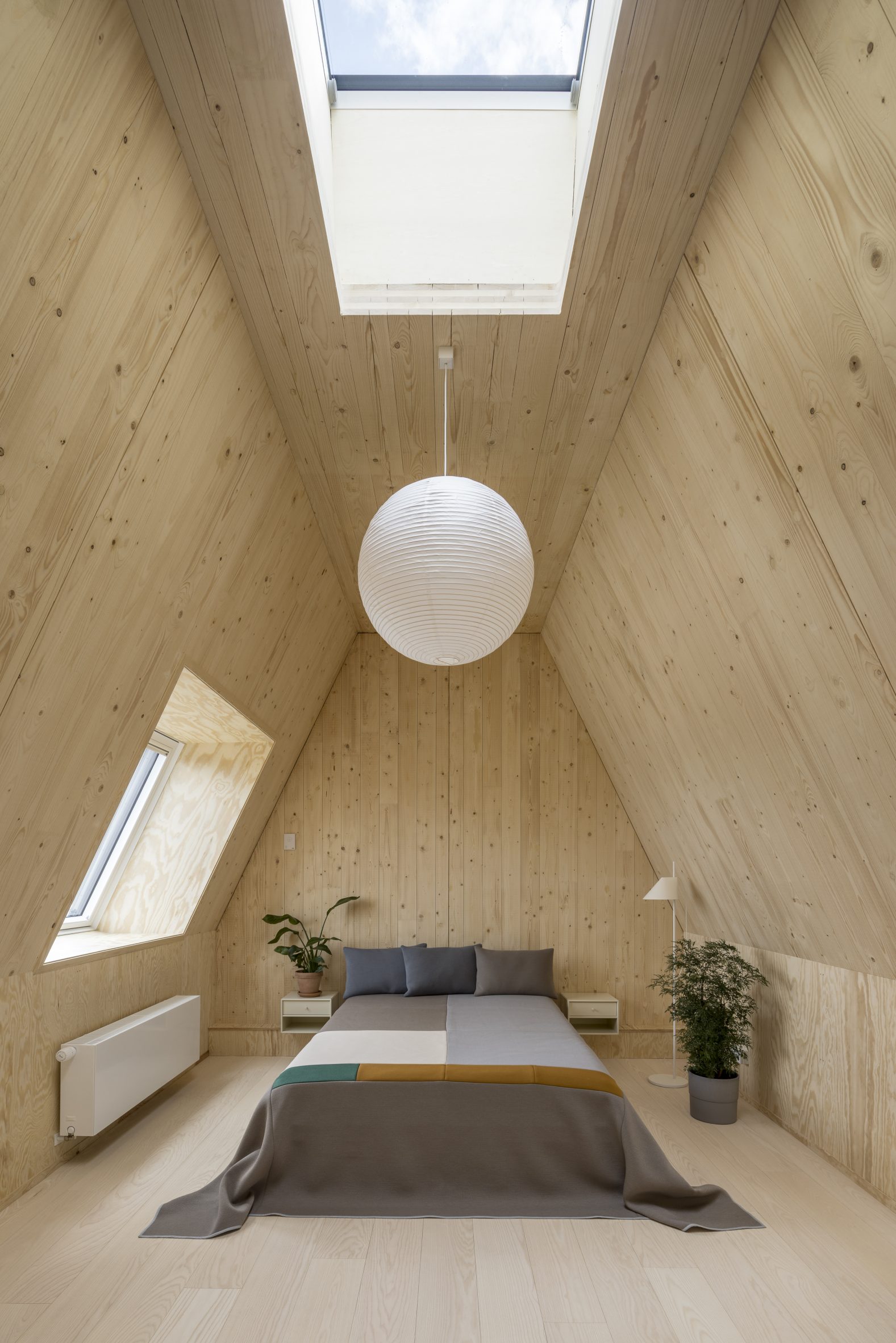


The partners involved in Living Places recently reflected on the project's learnings and the benefits of adopting a new, collaborative approach to housebuilding, described as a "transformative partnership". "Transformative partnering is this new way of working where we, throughout the whole process, are all given a voice, collaborating toward the betterment of the goal," said Kasper Benjamin Reimer, head of innovation at EFFEKT. The concept equally embraces the input of all partners, including the architect, engineer and contractor, with each party acknowledging the value of their respective insight and knowledge. This led to collaboration at each point of the project, with all parties participating in discussions surrounding issues such as affordability and "buildability".

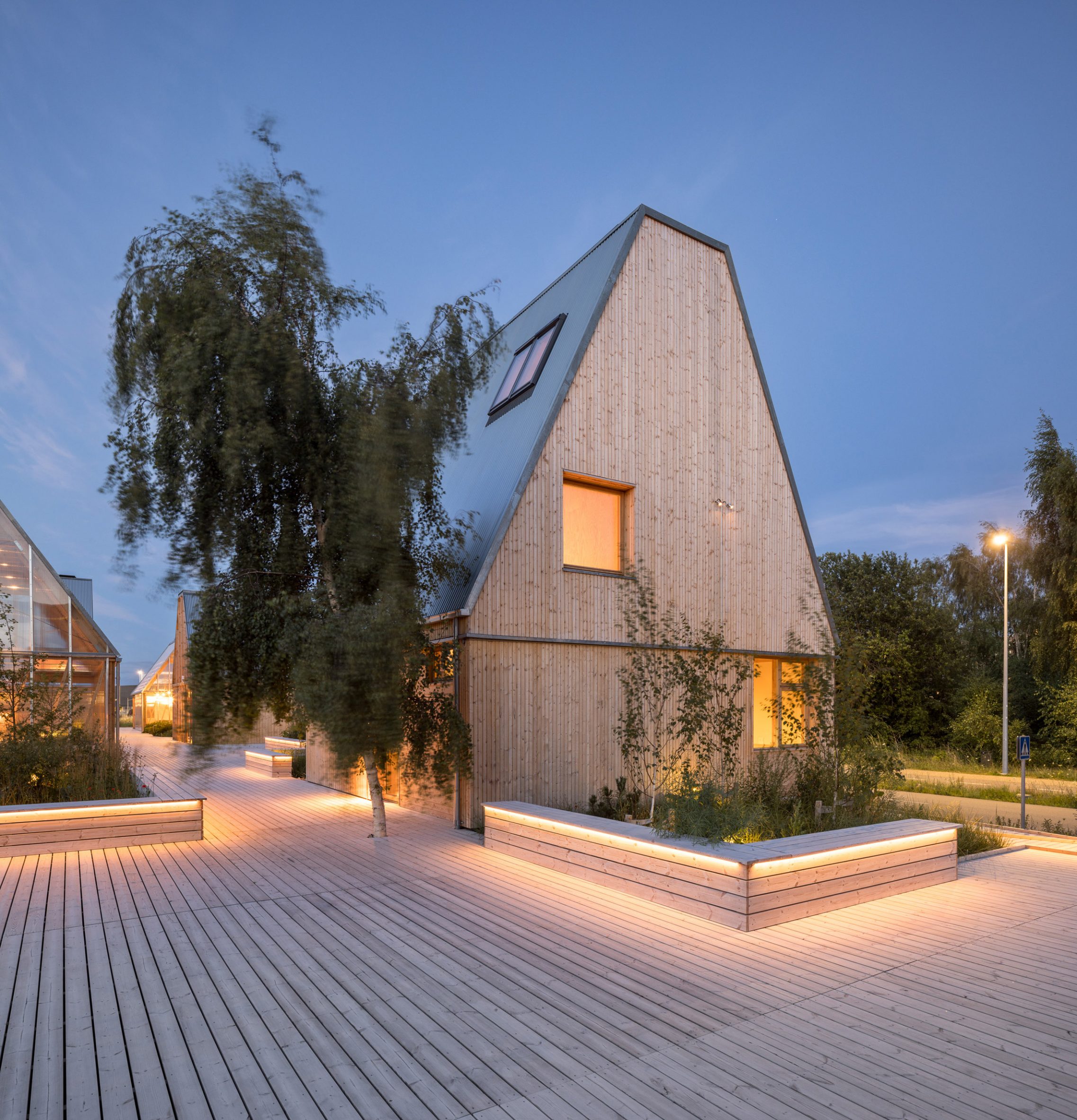


The approach behind the Living Places concept can be translated into five building principles: healthy, shared, simple, adaptive and scalable. According to Velux, these values can be applied to any building, community or city to create affordable and commercially viable homes that benefit both people and the planet. The healthy principle emphasises a sense of interconnectedness with the natural world, while the shared principle highlights the importance of community. The simple principle is a reminder to use resources mindfully, a lesson that resonated across the project team and heavily informed its work on the prototype. "The simple principles are for us as contractors also a way of thinking about how we assemble the elements of a building," said Sophus Hedegaard Johannesen, relations and marketing director of Enemærke & Petersen. "How can we do that in the most simple, most cost-efficient [way]?" Meanwhile, the adaptive principle focuses on making housing design inclusive and empathetic of users' present and future needs, enabling living spaces to morph to accommodate the changing requirements of family units.
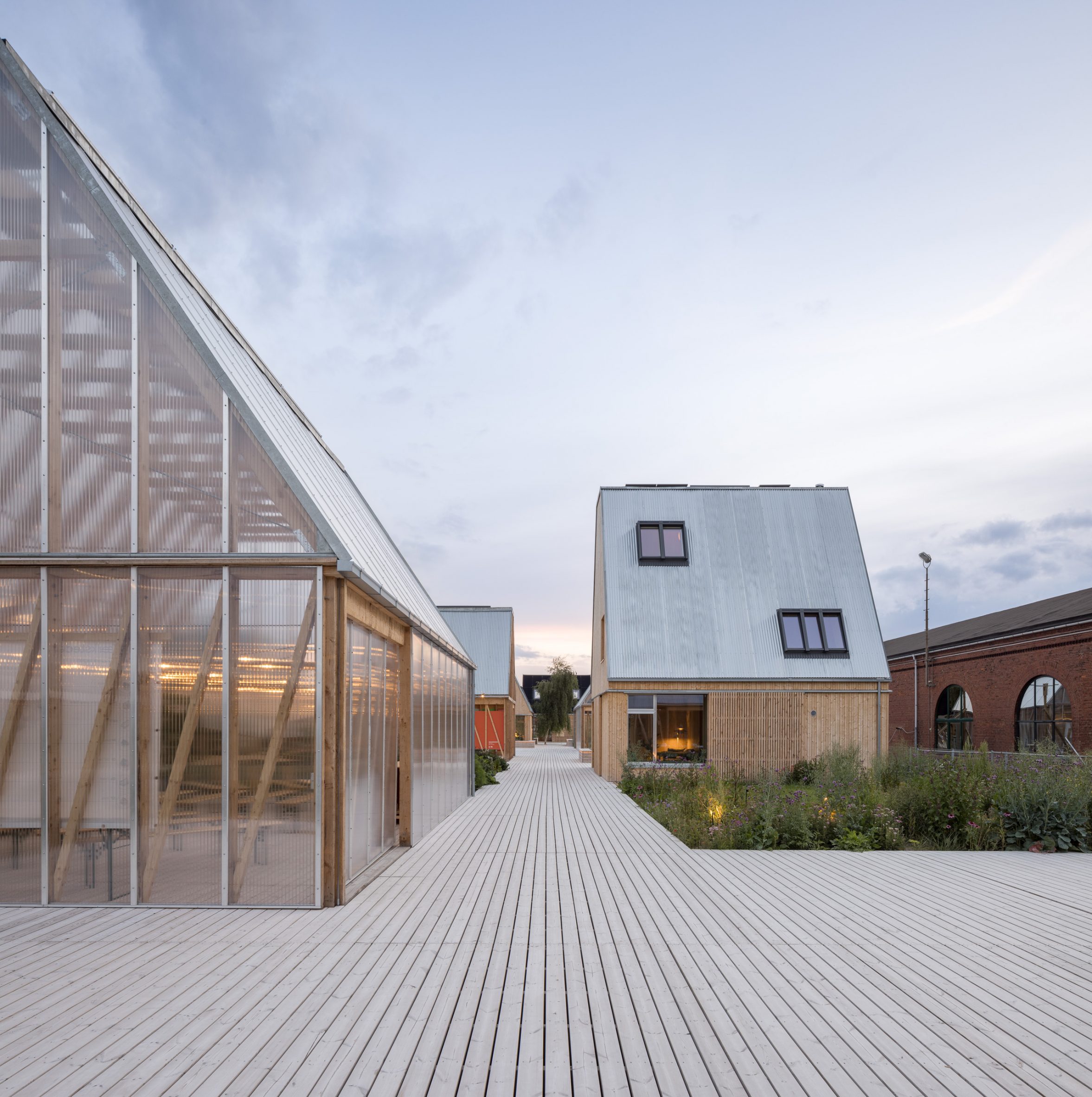


For Sinus Lynge, founding partner at EFFEKT Architects, scalability is one of the most crucial elements in the Living Places formula. He says that the concept can be translated into multiple affordable solutions for different housing types, encompassing not just single-family houses but apartments and row houses too. "The scalable principle is important because I believe that we have proven that we can build in this way within the sort of budget and price points of traditional housing," said Lynge. The Living Places concept is built upon what Velux calls a people and planet methodology. This holistic approach considers the environmental footprint of the entire lifetime of the building, spanning the production of materials, the construction phase, the home's occupation and the future of the structure after it has fulfilled its use. Consequently, the home was designed for disassembly at the end of its life, allowing the materials to be repurposed. The prototype also prioritises the experience of future residents. The design is characterised by a steeply sloped, flat-topped roof, which was designed to create double-height spaces that optimise natural ventilation and light. The housing concept has a class one indoor climate – the best-performing ranking under the Energy Performance Directive for Buildings' Criteria for the Indoor Environment – owing to its optimisation of daylight and fresh air.
snip







Velux shares the "innovative" process behind Living Places housing concept in Copenhagen
https://www.dezeen.com/2024/04/04/living-places-copenhagen/

Window manufacturer Velux has highlighted the lessons learned by the partners behind its experimental Living Places housing concept. Living Places Copenhagen, which has an ultra-low CO2 footprint, is a prototype village built in collaboration with Danish architecture studio EFFEKT, consulting engineering firm Artelia and contractor Enemærke & Petersen. The concept was brought to life last year with the construction of seven prototype homes in Copenhagen. It aims to establish an affordable, alternative route to building low-carbon housing that prioritises healthy, adaptable and community-oriented design. The team behind the project believes this "innovative" approach can set a new precedent for the way we build and design homes and is sharing this knowledge with the hopes it can be implemented across the industry.



The partners involved in Living Places recently reflected on the project's learnings and the benefits of adopting a new, collaborative approach to housebuilding, described as a "transformative partnership". "Transformative partnering is this new way of working where we, throughout the whole process, are all given a voice, collaborating toward the betterment of the goal," said Kasper Benjamin Reimer, head of innovation at EFFEKT. The concept equally embraces the input of all partners, including the architect, engineer and contractor, with each party acknowledging the value of their respective insight and knowledge. This led to collaboration at each point of the project, with all parties participating in discussions surrounding issues such as affordability and "buildability".




The approach behind the Living Places concept can be translated into five building principles: healthy, shared, simple, adaptive and scalable. According to Velux, these values can be applied to any building, community or city to create affordable and commercially viable homes that benefit both people and the planet. The healthy principle emphasises a sense of interconnectedness with the natural world, while the shared principle highlights the importance of community. The simple principle is a reminder to use resources mindfully, a lesson that resonated across the project team and heavily informed its work on the prototype. "The simple principles are for us as contractors also a way of thinking about how we assemble the elements of a building," said Sophus Hedegaard Johannesen, relations and marketing director of Enemærke & Petersen. "How can we do that in the most simple, most cost-efficient [way]?" Meanwhile, the adaptive principle focuses on making housing design inclusive and empathetic of users' present and future needs, enabling living spaces to morph to accommodate the changing requirements of family units.



For Sinus Lynge, founding partner at EFFEKT Architects, scalability is one of the most crucial elements in the Living Places formula. He says that the concept can be translated into multiple affordable solutions for different housing types, encompassing not just single-family houses but apartments and row houses too. "The scalable principle is important because I believe that we have proven that we can build in this way within the sort of budget and price points of traditional housing," said Lynge. The Living Places concept is built upon what Velux calls a people and planet methodology. This holistic approach considers the environmental footprint of the entire lifetime of the building, spanning the production of materials, the construction phase, the home's occupation and the future of the structure after it has fulfilled its use. Consequently, the home was designed for disassembly at the end of its life, allowing the materials to be repurposed. The prototype also prioritises the experience of future residents. The design is characterised by a steeply sloped, flat-topped roof, which was designed to create double-height spaces that optimise natural ventilation and light. The housing concept has a class one indoor climate – the best-performing ranking under the Energy Performance Directive for Buildings' Criteria for the Indoor Environment – owing to its optimisation of daylight and fresh air.
snip







April 19, 2024



A large tree lies at the heart of a cedar-clad residence in southern California designed by US studio Brett Farrow Architect, which used various tactics to "meld nature into the home's ethos". Located in the beach town of Encinitas, just north of San Diego, the house was designed to replace a family's existing ranch-style home that no longer fit their needs.


Brett Farrow Architect, which is based in the nearby town of Cardiff-by-the-Sea, set out to create a new residence that embodied a spirit of place. "The design of the home is a reflection on the natural environment and climate of coastal southern California," the studio said. Roughly square in plan, the new house rises two levels and totals 3,223 square feet (299 square metres). Facades are clad in Western red cedar that was lightly finished to preserve the wood's "natural beauty and unique character". The same cedar is found within the dwelling.


"Exterior finishes were used on the interior to create a pleasant confusion upon entry and a questioning of where the outside ended and the inside began," the studio said. Early in the design process, a guiding concern for the team was preserving a large, native Torrey pine tree that had been planted decades earlier and had grown to dominate the site.


"Although majestic in many ways, the tree, unfortunately, put the entire site in shade and made for a gloomy interior in the existing home," the studio said. To ensure brighter conditions in the new residence, the team inserted a courtyard into the plan, creating a dedicated space for the pine tree. Glazed walls were placed around the courtyard to bring in sunlight.
snip


Brett Farrow designs San Dieguito House to embrace setting in coastal California
https://www.dezeen.com/2024/04/17/brett-farrow-designs-san-dieguito-house-to-embrace-setting-in-coastal-california/


A large tree lies at the heart of a cedar-clad residence in southern California designed by US studio Brett Farrow Architect, which used various tactics to "meld nature into the home's ethos". Located in the beach town of Encinitas, just north of San Diego, the house was designed to replace a family's existing ranch-style home that no longer fit their needs.


Brett Farrow Architect, which is based in the nearby town of Cardiff-by-the-Sea, set out to create a new residence that embodied a spirit of place. "The design of the home is a reflection on the natural environment and climate of coastal southern California," the studio said. Roughly square in plan, the new house rises two levels and totals 3,223 square feet (299 square metres). Facades are clad in Western red cedar that was lightly finished to preserve the wood's "natural beauty and unique character". The same cedar is found within the dwelling.


"Exterior finishes were used on the interior to create a pleasant confusion upon entry and a questioning of where the outside ended and the inside began," the studio said. Early in the design process, a guiding concern for the team was preserving a large, native Torrey pine tree that had been planted decades earlier and had grown to dominate the site.


"Although majestic in many ways, the tree, unfortunately, put the entire site in shade and made for a gloomy interior in the existing home," the studio said. To ensure brighter conditions in the new residence, the team inserted a courtyard into the plan, creating a dedicated space for the pine tree. Glazed walls were placed around the courtyard to bring in sunlight.
snip


April 19, 2024

Jesse Watters of Fox News should be arrested for jury tampering and intimidation. If that is not a thing under the law,
then I say the law is an ass.
April 18, 2024

https://washingtonspectator.org/fascism-is-not-patriotism/

* * *
Growing up politically as a progressive Democrat, I never called conservative Republicans “fascist”, a) because they weren’t and b) because it sounded alarmist if not naive, the prevailing view being “only Hitler was Hitler.” That was and still is literally true…yet hopelessly dated since ignoring Donald Trump’s chesty Caesarism is now what’s truly naive. Which raises three separate though related questions: What’s the evidence that he’s an American Fascist? Should the mainstream media finally concede that should be a newsworthy part of the 2024 contest? And will branding him as one repel a small but decisive number of Independent voters to conclude, “Enough!”? There are of course avalanches of solo articles detailing Trump’s astonishing rhetoric, scandals and prosecutions. But in each instance, he belligerently “doubles down” — which by definition means there’s no depth he won’t descend to — and quickly offers up dog-ate-my-homework excuses: “It was a joke??Hillary and Joe are worse…what about Hunter?…that’s taken out of context…I never read Mein Kampf…Black prosecutors are racists!…that was A.I., not me…Trump Derangement Syndrome!…Witch Hunt!“ His calculation is apparently to isolate and disparage all criticism and indictments so they appear at worst to be aberrations and obscure how his whole is-worse-than-the-sum-of-his-parts, as if a pointillist were judged by only a few dabs of color rather than the entirely of the work. Which in Trump’s case would reveal a portrait far closer to Orban than Obama.
It’s tempting to respond to his rotating evasions with John McEnroe-worthy contempt: “You. Cannot. Be. Serious!” But in the current context of close polls and monumental stakes, mere indignation might allow him to keep escaping accountability through a combination of scandal fatigue, Trump judges, his base of delirious ideologues and credulous abettors, and GOP leaders paying tribute to Trump by shrugging off his predations. Add to that TeamTrump’s expectation that the Fourth Estate will just keep bothsides-ing every controversary due, in Molly Jong-Fast’s insight, to its “normalcy bias.” With his rants dominating coverage and polls barely budging after a year of startling news cycles, Democrats need more passionate language and memorable story lines to move the needle. Brian Klass in his best-selling Fluke, urges advocates to use “schemas… psychological tools to distill vast amounts of information into easily maintained categories.” Lincoln embraced his “rail splitter” moniker; Lenin took over Russia at the end of World War I with the penetrating slogan, “Land. Bread. Peace”; recent Republicans get it too, from Nixon’s “Silent Majority” to Reagan’s “Welfare Queen” to “Make America Great Again” and recently the rage over “Age.” What new schema could help keep Democrats on offense and the GOP on-the-ropes? One would be to portray Trump as a “fascist”, despite or perhaps because of how much of the media dismiss that truth as taboo.
snip
Fascism is not Patriotism: Why have we read a hundred times more about Joe's age than Donald's Caesarism?

https://washingtonspectator.org/fascism-is-not-patriotism/

April 19, 2025. WASHINGTON (AP) — At the direction of Donald Trump, forty-seventh president of the United States, Attorney General Ken Paxton yesterday sent teams of FBI agents to the residences of General Mark Milley, Eric Holder and Hillary Clinton. Knocking on their doors at precisely 9 a.m., the lead agents identically told each of their targets, “We’ve come to confiscate your electronic devices pursuant to a lawful warrant. You are not now under arrest.” Clinton appeared the most resigned. “What might the charges be?” “Sorry, ma’am,” said the female agent with a small ponytail and large vest emblazoned with the familiar oversized yellow lettering of the FBI. “We’re not now allowed to say.” Paxton late morning explained the administration’s reasoning. “May we remind critics that the American people have spoken?” an apparent reference to Trump’s electoral vote victory of 270 to 268, despite Biden’s popular vote margin of ten million votes over Trump—or 48 percent to 40 percent. (The remainder went to four minor party candidates.) The electoral college, however, for the third time in the last seven presidential elections, turned a popular vote victory into a narrow loss.
Secretary of Homeland Security Stephen Miller made additional news on immigration in a Newsmax interview. “Today, we’re beginning construction of 50,000 modular homes in Waco, Texas to launch ‘Operation Relocation’ to deport three million Americans who came here illegally. Promise made. Promise kept.” The Pentagon also yesterday sent in federal troops under the 1871 KKK Insurrection Act to a dozen cities holding long-planned “Democracy, Not Dictatorship” protests — organized by MoveOn, Brady United and the ACLU. Tens of thousands of peaceful marchers in each location were shocked to encounter M1 Abrams tanks rolling down city streets to block their paths with tear gas, flash grenades, and rubber bullets. Thirteen students were killed in Atlanta alone when they stood in front of tanks that wouldn’t stop. Reporters caught up with President Trump early afternoon in between rounds of golf at his Bedminster Club in New Jersey.. “Well, didn’t Biden do the same thing to me and Rudy? Sad about the deaths in Atlanta but, excuse me, what were those protestors doing in front of our tanks? Anyway, I’d like to remind all Americans that today is the 250th anniversary of the battles of Lexington and Concord that began our journey as an exceptional model of freedom and democracy.”
Secretary of Homeland Security Stephen Miller made additional news on immigration in a Newsmax interview. “Today, we’re beginning construction of 50,000 modular homes in Waco, Texas to launch ‘Operation Relocation’ to deport three million Americans who came here illegally. Promise made. Promise kept.” The Pentagon also yesterday sent in federal troops under the 1871 KKK Insurrection Act to a dozen cities holding long-planned “Democracy, Not Dictatorship” protests — organized by MoveOn, Brady United and the ACLU. Tens of thousands of peaceful marchers in each location were shocked to encounter M1 Abrams tanks rolling down city streets to block their paths with tear gas, flash grenades, and rubber bullets. Thirteen students were killed in Atlanta alone when they stood in front of tanks that wouldn’t stop. Reporters caught up with President Trump early afternoon in between rounds of golf at his Bedminster Club in New Jersey.. “Well, didn’t Biden do the same thing to me and Rudy? Sad about the deaths in Atlanta but, excuse me, what were those protestors doing in front of our tanks? Anyway, I’d like to remind all Americans that today is the 250th anniversary of the battles of Lexington and Concord that began our journey as an exceptional model of freedom and democracy.”
* * *
Growing up politically as a progressive Democrat, I never called conservative Republicans “fascist”, a) because they weren’t and b) because it sounded alarmist if not naive, the prevailing view being “only Hitler was Hitler.” That was and still is literally true…yet hopelessly dated since ignoring Donald Trump’s chesty Caesarism is now what’s truly naive. Which raises three separate though related questions: What’s the evidence that he’s an American Fascist? Should the mainstream media finally concede that should be a newsworthy part of the 2024 contest? And will branding him as one repel a small but decisive number of Independent voters to conclude, “Enough!”? There are of course avalanches of solo articles detailing Trump’s astonishing rhetoric, scandals and prosecutions. But in each instance, he belligerently “doubles down” — which by definition means there’s no depth he won’t descend to — and quickly offers up dog-ate-my-homework excuses: “It was a joke??Hillary and Joe are worse…what about Hunter?…that’s taken out of context…I never read Mein Kampf…Black prosecutors are racists!…that was A.I., not me…Trump Derangement Syndrome!…Witch Hunt!“ His calculation is apparently to isolate and disparage all criticism and indictments so they appear at worst to be aberrations and obscure how his whole is-worse-than-the-sum-of-his-parts, as if a pointillist were judged by only a few dabs of color rather than the entirely of the work. Which in Trump’s case would reveal a portrait far closer to Orban than Obama.
It’s tempting to respond to his rotating evasions with John McEnroe-worthy contempt: “You. Cannot. Be. Serious!” But in the current context of close polls and monumental stakes, mere indignation might allow him to keep escaping accountability through a combination of scandal fatigue, Trump judges, his base of delirious ideologues and credulous abettors, and GOP leaders paying tribute to Trump by shrugging off his predations. Add to that TeamTrump’s expectation that the Fourth Estate will just keep bothsides-ing every controversary due, in Molly Jong-Fast’s insight, to its “normalcy bias.” With his rants dominating coverage and polls barely budging after a year of startling news cycles, Democrats need more passionate language and memorable story lines to move the needle. Brian Klass in his best-selling Fluke, urges advocates to use “schemas… psychological tools to distill vast amounts of information into easily maintained categories.” Lincoln embraced his “rail splitter” moniker; Lenin took over Russia at the end of World War I with the penetrating slogan, “Land. Bread. Peace”; recent Republicans get it too, from Nixon’s “Silent Majority” to Reagan’s “Welfare Queen” to “Make America Great Again” and recently the rage over “Age.” What new schema could help keep Democrats on offense and the GOP on-the-ropes? One would be to portray Trump as a “fascist”, despite or perhaps because of how much of the media dismiss that truth as taboo.
snip
Profile Information
Gender: FemaleHometown: London
Home country: US/UK/Sweden
Current location: Stockholm, Sweden
Member since: Sun Jul 1, 2018, 07:25 PM
Number of posts: 43,291